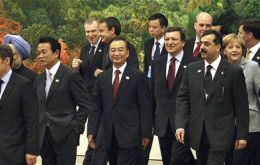MercoPress. South Atlantic News Agency
Economy
-
Tuesday, October 28th 2008 - 20:00 UTC
UK calls on China and Gulf states to boost IMF resources
British Prime Minister Gordon Brown called on Tuesday for an increase in funding of the International Monetary Fund (IMF) to cut the risk of “financial contagion” and said China and oil-rich Gulf states should make the bulk of the contributions.
-
Tuesday, October 28th 2008 - 20:00 UTC
Markets alone can't ensure housing for all, says UN

The mortgage crisis that is at the heart of the current financial turmoil reflects “fundamental” flaws in the way countries approach housing, and highlights the danger in thinking that markets alone will ensure adequate housing for all, said an independent United Nations human rights expert.
-
Tuesday, October 28th 2008 - 20:00 UTC
Income inequality since 2000 has risen in US and Germany

The gap between rich and poor in most wealthy nations has widened, revealed the Organization for Economic Co-operation and Development (OECD). Across the 24 OECD countries where data was available, the cumulative rise in inequality was 7% over the past 20 years, the Paris-based group said. But this was not as large a rise as had been expected, it said.
-
Monday, October 27th 2008 - 20:00 UTC
Uruguay admits “modest” impact from global slowdown

The Uruguayan government admitted it expects growth to slow down as a consequence of the international financial crisis which is spreading to the real economy as demand retracts in the main world blocks.
-
Sunday, October 26th 2008 - 20:00 UTC
PM Brown: UK 'prepared for economic storm'

Britain is “better prepared” than other countries to weather the global economic storm, Gordon Brown has insisted despite the UK recording its worst economic performance for 18 years.
-
Sunday, October 26th 2008 - 20:00 UTC
Asia/Europe summit call for reform and greater IMF role
Asian and European leaders have called for comprehensive reform of the global financial system. Ending a summit in Beijing, they also urged the International Monetary Fund (IMF) to play a greater role in helping countries hit by the market turmoil. UN chief Ban Ki-moon called for action to help affected developing nations.
-
Saturday, October 25th 2008 - 20:00 UTC
Asia-Europe concert efforts for coming financial summit

Asian and European leaders called for a concerted effort to weather a financial crisis that originated from the United States and has now spread globally as the 7th Asia-Europe meeting opened on Friday.
-
Saturday, October 25th 2008 - 20:00 UTC
Latam prospects conditioned to commodity prices
Latin American economic growth may slow more than expected in 2009 due to lower prices for the commodities that drive many of the region's economies, the International Monetary Fund said this week in Chile.
-
Saturday, October 25th 2008 - 20:00 UTC
Global crisis: East Asian nations pledge 80 billion USD

East Asian nations have pledged to set up an 80 billion US dollars swap scheme by mid-2009 to help protect the region from financial turmoil. The move by the 10-member Association of Southeast Asian Nations (Asean) is backed by South Korea, China and Japan.
-
Saturday, October 25th 2008 - 20:00 UTC
IMF Emergency financing mechanism has 200 billion USD
The International Monetary Fund, which has announced its readiness to act in support of nations hit by fallout from the global financial turmoil, is holding talks with several countries about possible new lending programs. According to an official release IMF has 200 billion US dollars ready for loans.
